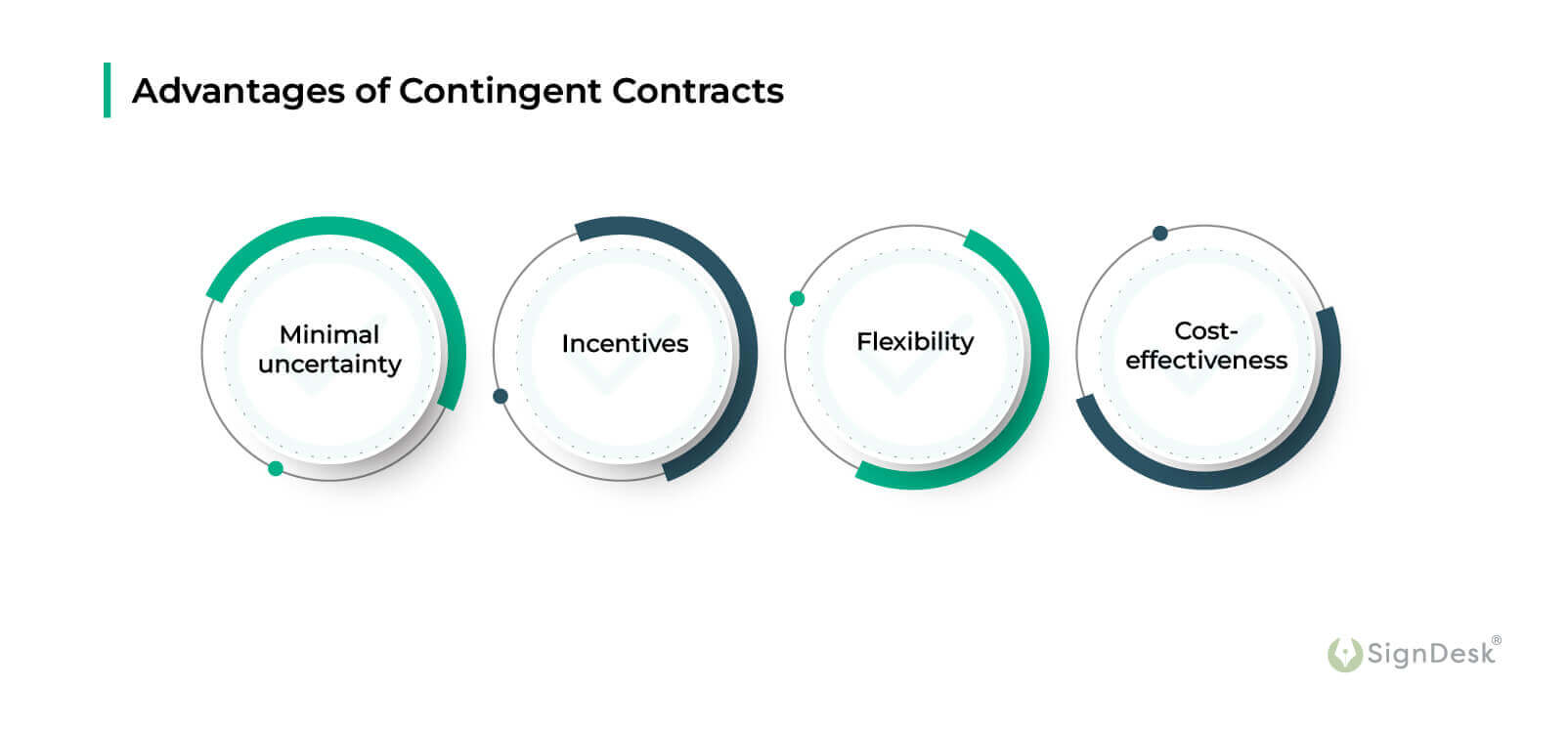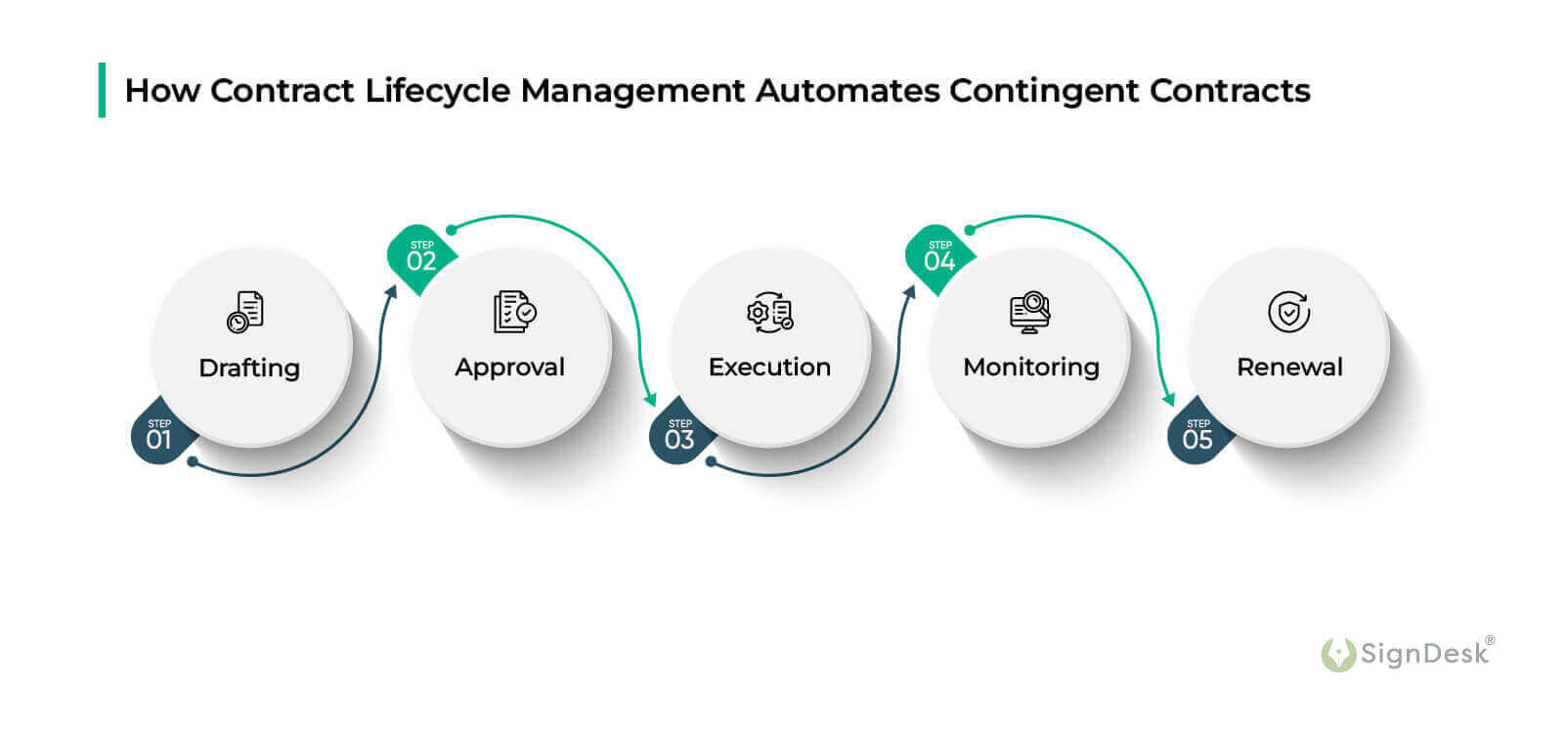What Is A Contingent Contract?
A contingent contract is an agreement in which the parties involved agree to fulfill obligations only if a specified scenario or event occurs in the future. The occurrence of the stated event will determine whether the parties are required to perform or fulfill their obligations under the terms of the contract.
A agrees to pay B INR 10,000 if B’s home is burned down. This is an example of a simple contingent contract.
According to Section 31 of the Indian Contract Act of 1872, a contingent agreement is defined as follows:
“A contingent contract is a contract to do or not to perform something, depending on whether an event related to the contract occurs.”
Contingent contracts can appear in a wide range of situations, such as employment contracts, real estate deals, insurance policies, and many more. They are frequently used to control risk and uncertainty because they let parties reach agreements while taking into account the likelihood that certain events could or might not happen.
Elements Of A Contingent Contract
According to section 31 of the Contract Act, a dependent contract must include these components.
Occurrence Dependence
A contingent contract shall be regarded legal only if an event occurs or does not occur and it is collateral to the contract.
Conditional Contract Performance
The contingent contract definition of a contingent contract is that the contract’s collateral requirements must occur with certainty in the future. A contract must have a condition in order to be considered contingent. According to Sections 32 and 33 of the Contract Act, the fulfilment of the collateral requirements must occur before a contingent contract may be enforced.
Future Specific Conditions
A contract will only be regarded as dependent if the stated event is a potential future occurrence.
Collateral Specific Conditions
A contingent contract is one that depends on the happening or not happening of an event. This incident must be ancillary to the contract and not a part of the compensation indicated in the contract. The contingency must involve a distinct circumstance.
When Can A Contingent Contract Be Enforced?
The contingent contract sections i.e., sections 32 to 36 include the following provisions about the enforcement of the contingent contract. This can also be considered the different types of contingent contract. These are as follows:
Condition #1: Contract enforcement is subject to the occurrence of an event
The commitment to act or refrain from acting in the case of an uncertain future occurrence. Yet, until the event occurs, the contract cannot be legally enforced. Such agreements are null and invalid if the occurrence is rendered impossible.
Condition #2: Contract enforcement is subject to a triggering event not occurring
If the event has already occurred or becomes impossible to occur, the contingent contract is void. In such cases, the parties to the contract are no longer obligated to perform their respective obligations under the agreement, and the contract becomes unenforceable.
Condition #3: Contracts that are required to be completed within a period of time
Contracts that specify what will happen if a specific event occurs within a specified time frame. If the event does not occur and the time period has passed, the contract is null and invalid. Also, it is null and invalid if, prior to the scheduled time, the event becomes unable to occur.
Condition #4: Contracts contingent on occurrence not event within a period
After the specified period has passed and the uncertain event has not occurred, or before the specified time has passed, if it is certain that the event will not occur, a contingent contract to do or not do anything may be enforced by law.
Condition #5: Contracts with impossible conditions are invalid
If an agreement to do or not to do is based on the impossible occurrence, then such agreement is void, if the impossibility of the event is known or not to the parties to the agreement at the time when it is made.
Advantages Of Contingent Contracts
As contingent contracts provide for more flexibility than standard contracts, they may be a useful tool for many organisations. They also offer several additional benefits:

-
Minimal uncertainty:
Contingent contracts provide parties a way to control risk by giving them a way to reduce possible losses should certain things happen.
-
Flexibility:
These contracts allow parties to modify the parameters of the agreement in response to the presence or absence of particular circumstances.
-
Incentives:
Contingent contracts incentivize parties to work towards the successful occurrence or nonoccurrence of specific events, which may result in better results for both parties.
-
Cost-effectiveness:
Contingent contracts can be a cost-effective approach to organizing a business since they frequently involve less upfront investment than conventional contracts.
Commercial Applications Of Contingent Contracts
Contingent contracts are frequently utilized for a variety of business purposes, such as:
-
Insurance:
Policies that cover particular catastrophes like accidents, illnesses, or natural disasters are fundamentally dependent contracts. If the insured event occurs, the insurer promises to pay the insured a certain sum.
-
Real estate:
Contingent contracts are frequently used in real estate transactions, in which a buyer agrees to buy a property only if a number of conditions are satisfied, including the conclusion of a house inspection, getting financing, or resolving any title difficulties.
-
Construction:
Contingent contracts are frequently used to manage risk and uncertainty in the construction sector. For instance, a builder could promise to finish a project but only if specific requirements are satisfied, including getting the required permissions or finding funding.
-
Employment:
Contingencies relating to job performance, pay, or other elements may be included in employment contracts. For instance, if a salesman meets specific sales goals, they may be paid a commission.
-
Commodities:
To control the risk associated with price volatility, contingent contracts are employed to trade commodities. For instance, a buyer could consent to buy a specific amount of a commodity at a particular price, but only if the price stays within a specific range.
How Contract Lifecycle Management Automates Contingent Contracts
An efficient contract CLM tool can help the activity of managing contracts from the beginning to the end. In contingent contracts, CLM can be helpful in a number of ways, including:

-
Drafting:
CLM software can assist in creating contingent contracts by helping to specify the stipulations and conditions that must be satisfied before the contract can be implemented. This is done using clause & template libraries.
-
Approval:
CLM solutions can aid in expediting the process for contingent contracts’ approval with online approval & negotiations, to ensure that all parties evaluate and provide their consent before the contract is carried out.
-
Execution:
Depending on the occurrence of the stated event or condition, CLM technologies can assist in automating the execution of contingent contracts with electronic & digital signature integrations.
-
Monitoring:
Smart CLM software employs performance tracking & contract analytics to make sure that all contingent contract requirements are completed and that the contract is being carried out as planned
-
Renewal:
CLM solutions may assist in managing the renewal of contingent contracts by keeping track of their expiration dates and reminding parties to extend or renegotiate the agreement as necessary.
Here are some features that companies may leverage to manage contingent contracts using efficient CLM software:
-
Template Libraries:
AI-enabled contract templates clause recommendations, and automated contract procedures are used to minimize the number of human activities and dependencies involved in drafting contingent contracts.
-
Digital Negotiations:
Parties negotiate contingent clauses online using real-time suggestions, clause locking features, tokenization & content libraries.
-
Bulk Upload for eSign:
To speed up contract execution and boost audit effectiveness, use scalable upload & eSign processes, eSignature connections, and a virtual audit trail.
-
Centralized Contract Storage:
All contracts are tagged and stored in a searchable repository for easy retrieval and tracking. Custom renewal & expiry alerts are sent to stakeholders when contracts are up for renewal.
-
Status and Performance Tracking:
Pre- and post-signature processes for contingent contracts are streamlined using automated renewals & performance monitoring. Contract analytics learn from performance to provide decision-making support.
CONTR.ACT: SignDesk’s Contract Management Solution
Teams can draft contracts, negotiate clauses in real-time, and automate contract processes with SignDesk’s end-to-end contract manufacturing software , contract management software, CONTR.ACT.
SignDesk’s Smart CLM solution enables scalable upload to eSign workflows, streamlined milestone management & active status tracking with eSignature and eStamping integrations, to help businesses stay on top of their contracts.
Our clients have leveraged Smart CLM to slash TAT on contract workflows by up to 50% and ensure compliance using a robust virtual audit trail for all contract activities.
To learn more about how our contract lifecycle management system can expedite contingent contracts, contact one of our solution consultants today.
Get a free trial now!
